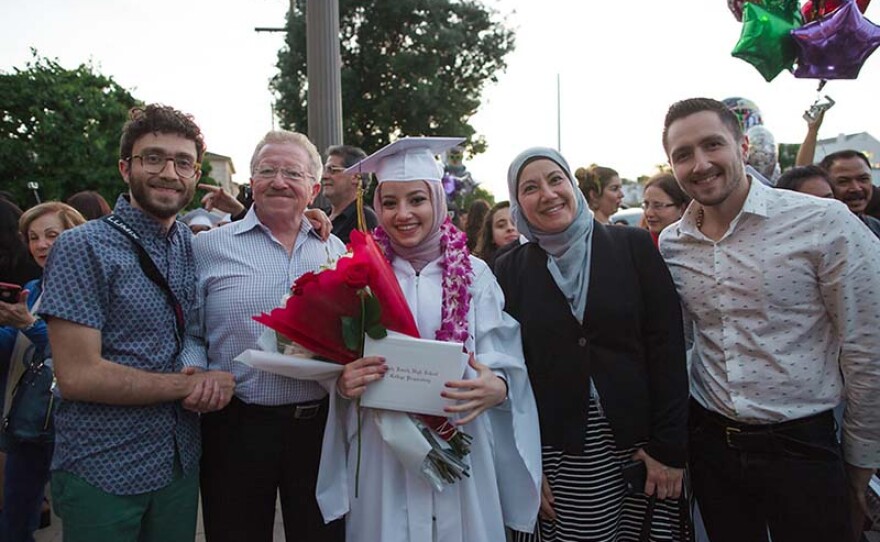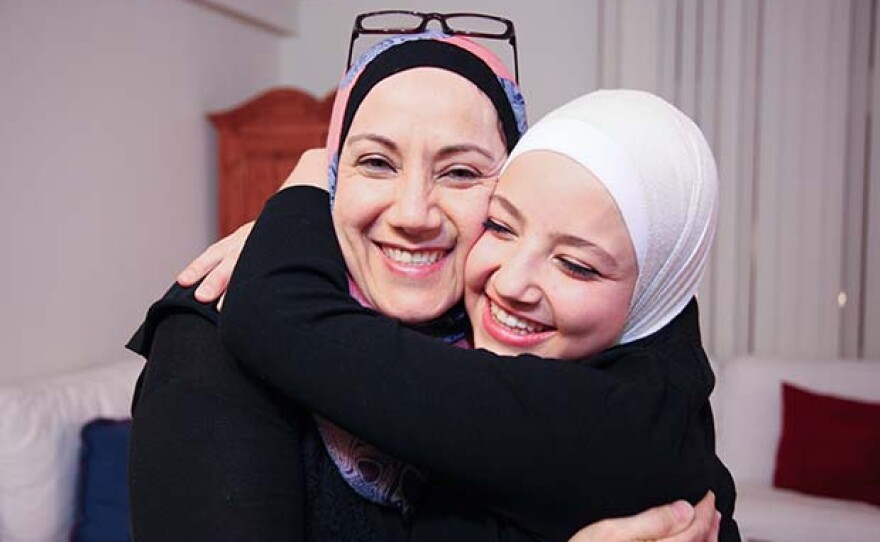Learn about a displaced Syrian family and a Coast Guard captain in the middle of a refugee crisis.
POV’s 30th season kicks off with a series of films on the Syrian war and the ongoing global refugee crisis:
The first, "Dalya’s Other Country," follows a young Syrian girl and her mother who have been displaced by the war at home and are adjusting to their new life in Los Angeles.
The feature doc will premiere with two shorts also focusing on the refugee crisis:
The Oscar®-nominated short "4.1 Miles" spotlights a small Greek town on the sea and the coast guard’s daily efforts at saving thousands of migrants crossing the Mediterranean.
In "From Damascus to Chicago," two Syrian siblings recently resettled in Chicago enroll in a dance class, and their entire family makes efforts to navigate a new city and country.
MORE ABOUT DALYA:
A smiling, effervescent teenager is the focus of the new documentary "Dalya’s Other Country," which tells the remarkable story of a family displaced by the Syrian conflict and explores a young life caught between highly politicized identities.
Dalya comes across as an ordinary Southern California teenager. She takes selfies and goes to prom. She plays sports and hangs out at the mall. She is also the only student at her Catholic high school who wears a hijab.
In 2012, Dalya moved to the United States from Aleppo, Syria, as her country disintegrated in the wake of a horrific civil war.
Starting in 2013, the film follows Dalya and her mother through what seems at first a typical immigration experience. They adjust to unfamiliar American ways, even as they maintain the cultural and religious traditions that sustain them.
However, they grow tense and anxious as the 2016 presidential campaign unfolds and candidate Donald Trump calls for restrictions on Muslim immigrants.
At school, Dalya recites the Pledge of Allegiance. She dances in a talent show and wears her hijab as she plays on the basketball team.
“Before, I was scared of doing everything. I wouldn’t do sports. I didn’t join basketball,” she says. But as Dalya adjusts to her American life, she becomes comfortable testing her abilities: “It doesn’t matter if have my hijab. I found out that I can do whatever.”
It was Dalya’s resilience that stood out most for the film’s director. “I first met Dalya when she was in her freshman year,” said filmmaker Julia Meltzer. “She was definitely shy and hesitant and getting used to her environment. Over the course of four years, I saw her really come into her own. I hope the viewers of Dalya’s Other Country understand something about what it’s like to be a young Syrian Muslim woman coming of age in Southern California.”
Nevertheless, Dalya’s mother, Rudayna, worries about her daughter throughout the film. “She was 13 when we came here, a dangerous age,” Rudayna says. “She looked around her and she tried to do things like other girls.”
Adjustment to life in the U.S. has been difficult for Rudayna, who tells the wrenching story of how the family came to leave Syria. “We were sleeping one night,” she recalls. “We heard, like, a big bomb around our house.” The war had started, and, she says, girls were being kidnapped. “The war didn’t leave any choice for me. I had to come here with my daughter.”
Dalya’s father, Mohamad Hassan, lives in Turkey and remains there partly because of his olive-oil exporting business. But the true reason he and Rudayna are estranged is that he has taken a second wife.
“In my religion, it’s okay for the man to get married to two or three, four wives,” Rudayna says. Despite this, she could not accept Mohamad’s decision. “At that time, my marriage fell apart,” she says, “and then my country, too.”
"Dalya’s Other Country" follows a young girl’s coming-of-age, but it also highlights the challenges faced by older immigrants.
“I hope [viewers] also take in Rudayna’s experience and imagine for a second what it’s like to be an older Muslim Syrian women who raised kids and then found herself transplanted into a totally different culture, with an opportunity to become a different person in midlife,” said Meltzer.
That transformation takes place when Rudayna decides to take classes at a community college. “It was a big step for me,” says Rudayna. “My life in Syria, it was just cooking, cleaning, having people over. That’s it.”
Despite these new opportunities, Rudayna can’t help but feel out of place. “I feel like I’m on a different planet.… So many things to learn.”
In her final year of high school, Dalya plans for college and works on her application essay with her brother, Mustafa. She wonders whether moving to a new country and learning English affected her grades, and she cannot help but ponder what would have happened had she never emigrated: “If I still lived in Syria, I would have become a completely different person.”
“Opening our special series on the Syrian and refugee crises, 'Dalya’s Other Country' and its two accompanying shorts, '4.1 Miles' and 'From Damascus to Chicago,' bring Americans closer to seemingly far-flung events and the people affected by them,” said POV Executive Producer Justine Nagan. “With strong, identifiable subjects, these films make the issues accessible to viewers across the country. Whomever they connect with, audiences can come away from the season premiere with new, intimate perspectives on these ongoing events.”
WATCH ON YOUR SCHEDULE:
"Dalya’s Other Country" will stream online on pov.org in concurrence with its broadcast. Past episodes of POV are available for viewing on demand for a limited time after each broadcast.
JOIN THE CONVERSATION:
POV is on Facebook and Google +, and you can follow @povdocs on Twitter.
"Dalya's Other Country" is on Facebook, Instagram, and you can follow @DalyasOC on Twitter.
#DalyasOtherCountryPBS #4point1MilesPBS #DamascustoChicagoPBS

CREDITS:
A co-presentation with the Center for Asian American Media (CAAM).
"Dalya's Other Country" credits: Director, Producer: Julia Meltzer; Cinematographer: Anne Etheridge; Editor, Associate Producer: Catherine Hollander; Co-Producer: Mustafa Rony Zeno; Music: Asma Maroof, Daniel Pineda; Executive Producers for POV: Justine Nagan, Chris White.
"4.1 Miles" credits: Director/Producer/Editor/Cinematographer: Daphne Matziaraki; Consulting Producer: Orlando Bagwell; Executive Producer: Kathleen Lingo; Original Music: William Ryan Fritch; Additional Music: “Erotiko” by Thanos Mikroutsikos; Executive Producers for POV: Justine Nagan, Chris White.
"From Damascus to Chicago" credits: Directors/Producers/Editors/Cinematographers: Colleen Cassingham and Alex Lederman; Music: “Human Nature” by Steve Porcaro and John Bettis, performed by 2Cellos; Executive Producers for POV: Justine Nagan, Chris White.





